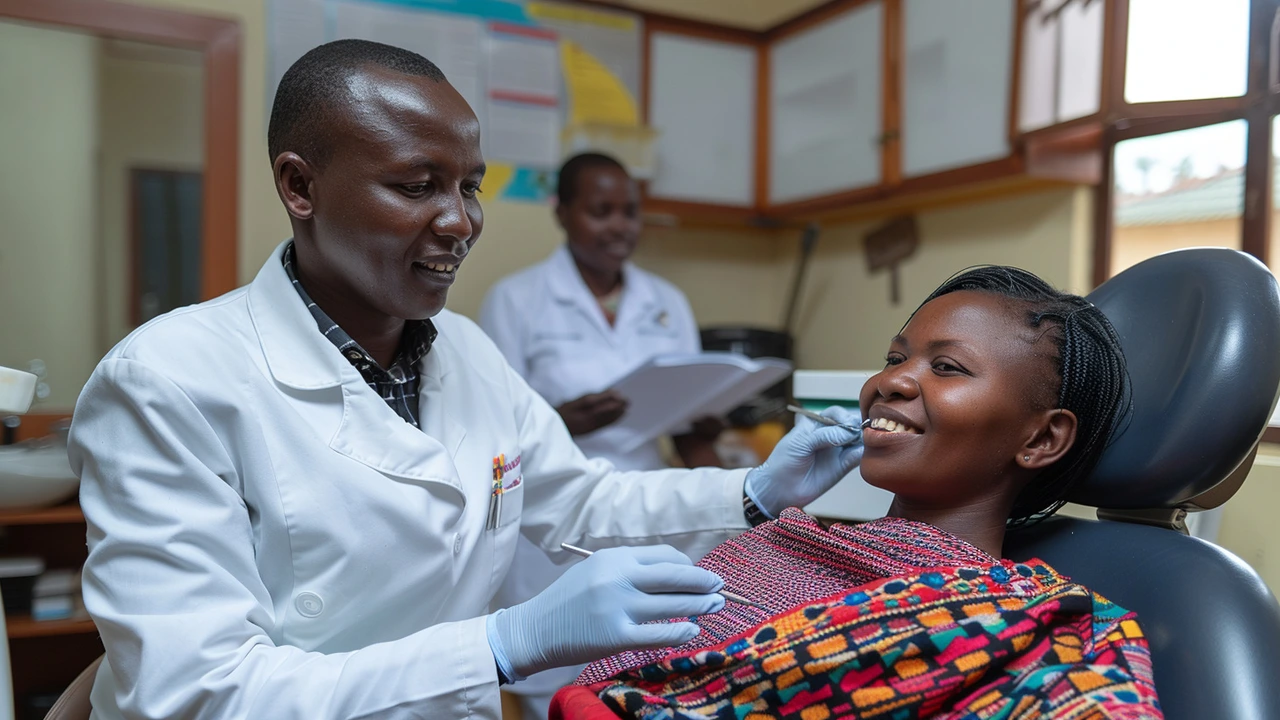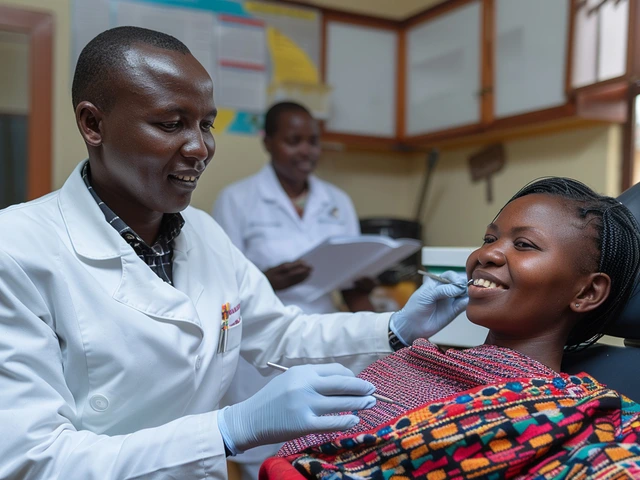So, you're curious about how much dentists make in Ethiopia? Whether you're considering a career in dentistry or just keen to understand the financial landscape of the profession, you've come to the right place.
In Ethiopia, the income of a dentist can vary widely based on several factors. Where they work, their experience level, and even their specialization can all influence their earnings. Let's dive into what you can expect as a dentist in Ethiopia, and shed some light on the financial prospects of this vital profession.
- Introduction to Dental Salaries in Ethiopia
- Factors Influencing Dentist Salaries
- Regional Variations in Pay
- Typical Workload and Duties
- Financial Prospects and Future Opportunities
Introduction to Dental Salaries in Ethiopia
When exploring the earnings of dentists in Ethiopia, it's important to recognize the nuances that come with this profession. While the global perception might suggest lavish earnings for dental practitioners, the reality often varies based on the country's economic landscape and healthcare system. In Ethiopia, a dentist's salary can reflect a wide array of factors such as location, type of practice, and experience level.
On average, a general dentist in Ethiopia might earn between 15,000 to 30,000 ETB per month. This range can fluctuate depending on the urban or rural setting of the practice. For instance, a dentist working in Addis Ababa, the capital, may command a higher salary compared to one in a smaller town due to the greater demand for specialized healthcare services in the city.
Moreover, private practitioners who own or co-own dental clinics often have higher earning potential compared to those employed by public hospitals or community health centers. Private practice allows for greater control over pricing and patient volume, translating to potentially higher incomes for entrepreneurial dentists. According to Dr. Mekonnen, a respected dental professional in Addis Ababa, "The freedom to set competitive prices and manage one's own client base makes private practice financially attractive. However, it also comes with its own set of challenges and financial risks."
Specialization is another significant factor. Dentists who pursue additional training in fields like orthodontics, oral surgery, or periodontics tend to earn more than general practitioners. This is due to the higher level of expertise required and the added value such specialists bring to their patients. A 2023 survey conducted by the Ethiopian Dental Association revealed that specialists could earn up to double what general dentists make, highlighting the financial benefits of advanced training.
Let's not forget about the impact of experience. Dentists fresh out of dental school typically start on the lower end of the salary spectrum. As they accumulate experience and build a reputation, their earning potential increases. A dentist with over ten years of experience can often expect to see a significant uplift in their earnings, reflecting their seniority and established patient trust.
The gender factor also plays a role in Ethiopia. While dentistry has seen an influx of female professionals, there's still a noticeable wage gap in certain regions. Efforts are underway by various professional groups to address these disparities, but progress is gradual. Acknowledging and bridging this gap remains a priority for the dental community.
A closer look at the educational background reveals that Ethiopian dentists typically undergo rigorous training, often spanning five to six years, including a compulsory internship. This extensive educational investment is a crucial underpinning for their professional and financial growth. However, graduates must navigate the initial phase of their careers thoughtfully to maximize their potential.
In summary, understanding the dynamics of dental salaries in Ethiopia requires a multi-faceted approach. By considering factors such as location, type of practice, specialization, experience, and gender, one can paint a comprehensive picture of what dentists in the country can expect to earn. This exploration offers valuable insights for aspiring dentists and those keen on understanding the profession's financial aspects within the Ethiopian context.
Factors Influencing Dentist Salaries
The salary of a dentist in Ethiopia is influenced by various factors that can significantly impact their take-home pay. Understanding these elements can help aspiring dentists make informed decisions about their careers and how to navigate the financial aspects of their profession.
One of the most crucial factors is experience. Just like in many other professions, the more experience a dentist has, the higher their salary is likely to be. A newly graduated dentist may start with a modest income, but as they gain more experience and develop their skills, their earning potential increases. Senior dentists with many years of practice often command higher salaries.
Another important factor is the level of education and specialization. Dentists who have pursued additional training or specializations in fields such as orthodontics or oral surgery tend to earn more than general practitioners. Specializations require additional years of study and training, but they often lead to higher salaries due to the advanced skills and expertise required.
"Specialized dentists usually see not only a higher patient load due to referrals but also higher pay as their services are more in demand," says Dr. Tesfaye Alemu, a renowned orthodontist in Addis Ababa.
The type of employer also plays a crucial role in determining salaries. Dentists working in private clinics or owning their own practices generally earn more compared to those employed in public hospitals or community health centers. Private practices tend to charge higher fees, allowing dentists to have better earning potential. However, working in public institutions might offer other benefits, such as job stability and additional allowances.
Location within the country is another variable. Dentists practicing in urban areas like Addis Ababa usually earn more than those in rural regions. The higher cost of living in cities often translates to higher fees for dental services, and there is typically a greater demand for specialized care. However, rural areas might offer other incentives such as government subsidies or housing allowances to attract healthcare professionals.
Lastly, the reputation and patient base of the dentist can also affect their salary. A dentist who has built a strong reputation for quality care and excellent patient relations is likely to attract more patients and, therefore, generate higher income. Word of mouth and positive reviews can significantly boost a dental practice, leading to better financial outcomes.
New dentists should consider these factors and strive to gain experience, pursue specializations of interest, and work towards building a solid reputation in their communities. By doing so, they can position themselves for better financial success in the field of dentistry in Ethiopia.

Regional Variations in Pay
Just like in many professions, dentists in Ethiopia can see a significant difference in wages depending on where they practice. Urban areas, especially Addis Ababa, tend to offer higher salaries than rural regions. This discrepancy primarily comes from the concentration of private clinics and the demand for specialized dental services in the capital city and other large towns.
In Addis Ababa, a dentist with a few years of experience can earn substantially more than their counterparts in rural areas. On average, a dentist in the capital might see a monthly income ranging from 15,000 to 30,000 ETB. In contrast, those working in rural health centers or smaller towns could make between 8,000 to 15,000 ETB monthly.
Several factors contribute to this variation. The cost of living is one aspect; urban areas usually have higher expenses, which necessitates higher wages. Another key reason is the availability of private practice opportunities. Many dentists in Addis Ababa supplement their income by working part-time in private clinics or establishing their own practices, where the rates for dental services are higher. Conversely, in rural areas, most dentists are employed by government health centers, where salaries are more standardized and less influenced by market demands.
Besides these factors, the availability of advanced dental equipment and facilities is another reason for the pay gap. Urban dental clinics are often better equipped and can offer a wider range of services, from basic dental care to more complex procedures like orthodontics and oral surgery. This capability allows urban dentists to charge more for their services, thereby earning a higher income.
Interestingly, some regions offer incentives to attract dentists to less populated areas. For instance, the Ethiopian government and various NGOs may provide housing, allowances, or bonuses to dentists willing to work in underserved regions. These benefits, though helpful, often do not bridge the gap entirely but do make rural positions slightly more appealing.
According to Dr. Tesfaye Mulugeta, a renowned dentist from Addis Ababa, "While urban areas offer higher salaries, the satisfaction of making a real difference in rural communities and the additional benefits provided can make these positions equally rewarding."
In summary, the regional variations in pay for dentists in Ethiopia are marked and influenced by multiple factors, including the cost of living, the nature of employment, access to private practice, and the availability of advanced dental equipment. These differences highlight the diverse landscape of dental profession in the country and underline the financial considerations aspiring dentists must weigh when choosing where to practice.
Typical Workload and Duties
Working as a dentist in Ethiopia involves a variety of responsibilities that go beyond just fixing teeth. A dentist's day usually starts early, often around 8 a.m., and can extend into the late afternoon or even evenings, depending on the practice's hours and patient load. Patients come in with a variety of needs, from routine check-ups to more complex procedures like root canals and surgeries. This means a dentist must be skilled in multiple dental disciplines to cater to these diverse needs.
A big part of a dentist's job is to educate patients on proper oral hygiene. This includes advising on brushing techniques, the importance of flossing, and the impact of diet on oral health. In Ethiopia, where access to dental care can be limited in rural areas, this educational role becomes even more crucial. By spreading awareness, dentists help to prevent common dental issues like cavities and gum disease, which are prevalent due to poor oral hygiene practices and lack of regular check-ups.
Throughout the day, dentists perform examinations to diagnose dental conditions. Using tools like X-rays and other diagnostic equipment, they can spot issues that aren’t visible to the naked eye. Once an issue is detected, they develop a treatment plan tailored to the patient's needs. This could involve anything from filling cavities to performing more complex procedures like dental implants or orthodontic work.
Administrative duties also play a significant role in a dentist's daily routine. Whether they are managing their own practice or working within a larger clinic, dentists need to handle patient records, deal with insurance companies, and ensure the sterilization and cleanliness of their equipment and workspace. These tasks, while not as glamorous as working directly with patients, are essential for running a successful practice.
Dentists must also stay updated with the latest advancements in dental technology and treatment methods. Continuing education is a key part of a dentist’s career, involving attending workshops, conferences, and additional courses. This commitment to learning ensures they provide the best care possible and stay competitive in their field. Additionally, dentists in Ethiopia might encounter unique challenges such as a lack of resources or working in less-than-ideal conditions, especially in rural clinics. This makes adaptability and problem-solving crucial skills for success.
Dr. Amanuel, a seasoned dentist in Addis Ababa, once said, “Being a dentist here is about more than just treating teeth; it's about improving lives. In regions where dental care is sparse, every procedure we perform can make a huge difference in someone's quality of life.”
Overall, the typical workload for a dentist in Ethiopia is a blend of medical, educational, and administrative tasks. They juggle patient care with the ongoing need for professional development and face unique challenges that require dedication and resilience. Whether in a bustling city practice or a quiet rural clinic, dentists contribute significantly to the community’s health and well-being.

Financial Prospects and Future Opportunities
Dentistry in Ethiopia holds promising financial prospects for both current practitioners and future aspirants. The economic landscape has been shifting, bringing opportunities for growth in the healthcare sector, particularly within dental services. Dentists can expect their earnings to rise steadily with experience, reputation, and the ability to offer specialized treatments. On average, starting salaries for newly-qualified dentists range between ETB 15,000 to ETB 25,000 per month. These figures can increase substantially for those who establish a solid client base or work in more affluent areas.
Many dentists in Ethiopia opt to open their private practices after gaining several years of experience. Private practice setups usually allow for higher earnings compared to working in public health facilities. Successful private practitioners in urban centers like Addis Ababa can earn upwards of ETB 50,000 per month. Rural areas, while less lucrative in comparison, are beginning to offer competitive salaries due to an increasing demand for dental services.
Influence of Specialization
Specialization in fields such as orthodontics, periodontics, and oral surgery can provide an additional boost to a dentist’s income. Specialized dentists tend to charge higher fees for their services, reflecting the advanced skills and knowledge required for their practice. It's not unusual for specialized dentists to earn twice as much as their general practice counterparts.
“Dentists who choose to specialize and continuously update their skills are likely to see significant financial rewards in the long run,” says Dr. Alemu Tadesse, a well-known orthodontist based in Addis Ababa.
Moreover, the emerging trend of dental tourism presents another avenue for financial growth. Ethiopia's relatively affordable dental care costs, combined with improving healthcare standards, attract international patients seeking quality treatment at lower prices. This influx can significantly contribute to a prosperous practice for dentists willing to tap into this market.
Investment in Continuing Education
Continuing education and staying updated with the latest advancements in dental technology and practices are critical for maintaining and enhancing a dentist’s financial prospects. Workshops, certifications, and advanced training programs are increasingly available in Ethiopia. Participation not only ensures the provision of top-notch service but also enhances a dentist's reputation, thus allowing them to command higher fees.
Government initiatives and policies aimed at improving healthcare infrastructure are another factor that may boost the financial prospects of dentists in Ethiopia. The government has been making strides in increasing funding for health services, including dental care, to improve accessibility and quality. These initiatives often include financial incentives for healthcare providers, including loans for setting up clinics or subsidies for equipment.
The future looks bright for the dental profession in Ethiopia, with a growing population and increased awareness about oral health driving demand for skilled dental care. While it requires dedication and continuous learning, the long-term financial benefits can be substantial. For those willing to invest the time and effort, the rewards of a career in dentistry in Ethiopia are promising and likely to grow in the coming years.

 Dentist Salary in Ethiopia: Earnings, Insights, and Opportunities
Dentist Salary in Ethiopia: Earnings, Insights, and Opportunities
 Profitable Business Opportunities in Ethiopia
Profitable Business Opportunities in Ethiopia
 Navigating PayPal Banking Integration in Ethiopia: A Comprehensive Guide
Navigating PayPal Banking Integration in Ethiopia: A Comprehensive Guide
 Exploring the Major Occupation in Ethiopia: The Agricultural Backbone
Exploring the Major Occupation in Ethiopia: The Agricultural Backbone
 Best Business Opportunities in Ethiopia for 2024
Best Business Opportunities in Ethiopia for 2024
Kim Chase
June 2, 2024 AT 17:37Hey folks, just wanted to share that the range you see in the post is actually pretty realistic for many fresh grads, especially when you factor in the cost of living differences between Addis and the smaller towns. The data also shows that a lot of dentists boost their income by taking on short‑term contracts in NGOs or by doing outreach programs that pay per procedure. If you’re still in school, consider getting involved with community health projects early – they not only look good on a CV but they also help you build a patient base for when you open your own clinic. And don’t forget that the gender pay gap is slowly narrowing as more women take leadership roles in dental associations. Keep an eye on the upcoming workshops in Addis; they often cover the business side of dentistry and can give you a leg up.
David Werner
June 13, 2024 AT 03:37What they don’t tell you in the glossy brochures is that the higher salaries in the capital are propped up by a hidden network of corporate dental chains that siphon profits back to foreign investors! Those “private practices” are often just front companies, and the so‑called incentives for rural work are just a smoke screen to keep the real money flowing elsewhere. The whole system is a carefully constructed illusion designed to keep young dentists chasing the mirage of wealth while the real beneficiaries stay invisible.
Paul KEIL
June 23, 2024 AT 13:37Strategic remuneration paradigms within Ethiopian dental economics reflect a variance-driven compensation model predicated on geographic GDP differentials and practice modality synergies.
Horace Wormely
July 3, 2024 AT 23:37The figures presented in the article align with the latest data released by the Ethiopian Ministry of Health, which indicates that salaried dentists in public hospitals receive a base salary supplemented by performance-based allowances, whereas private practitioners generate income primarily through fee‑for‑service billing.
christine mae cotejo
July 14, 2024 AT 09:37The journey of a dentist in Ethiopia is nothing short of an epic saga that intertwines aspiration, perseverance, and the relentless pursuit of oral health excellence.
From the moment a student steps into the lecture hall, they are confronted with a curriculum that demands not only scientific rigor but also an understanding of the socioeconomic fabric that shapes patient expectations.
As they transition from theory to clinical rotations, the stark contrast between bustling urban clinics and modest rural health posts becomes a vivid tableau of disparity and opportunity.
In Addis Ababa, the clatter of modern equipment and the hum of sophisticated dental software create an atmosphere where cutting‑edge procedures are the norm.
Meanwhile, in the hinterlands, a solitary dentist may rely on basic instruments and improvisation, turning each appointment into a delicate dance of skill and compassion.
The financial repercussions of these divergent environments are palpable, with urban practitioners often commanding fees that reflect the premium status of their services.
Yet, the true value of a rural dentist is measured not in currency but in the profound impact on community wellbeing, where a single tooth extraction can restore a child's confidence and a mother's ability to nourish her family.
Moreover, the government’s recent incentives, including housing stipends and equipment grants, strive to bridge this gap, though they remain modest compared to the lucrative prospects of private practice.
Specialists, wielding advanced expertise in orthodontics or oral surgery, find themselves at the apex of this professional hierarchy, their earnings soaring as they attract patients from across the nation.
The gender pay gap, while gradually diminishing, still casts a lingering shadow, prompting professional societies to champion equity through mentorship programs and transparent salary reporting.
Continuing education, often delivered through weekend workshops or international conferences, serves as the lifeblood that sustains professional growth and justifies higher remuneration.
The entrepreneurial spirit that fuels many dentists to establish their own clinics is both a beacon of opportunity and a crucible of risk, demanding astute financial planning and relentless dedication.
Dental tourism, a nascent yet promising avenue, invites foreign patients seeking affordable yet quality care, adding another layer of revenue potential for forward‑thinking practitioners.
In summation, the financial landscape of dentistry in Ethiopia is a mosaic of variables-experience, location, specialization, and market dynamics-that together craft a nuanced portrait of earnings.
For the aspiring dentist, navigating this terrain with strategic foresight and an unwavering commitment to patient care will ultimately determine the extent of both professional fulfillment and monetary reward.
Douglas Gnesda
July 24, 2024 AT 19:37Great point about the compensation model, Doug. To add a bit more context, the base salary for a public‑sector dentist typically starts around 15,000 ETB, but you can see increments of roughly 2,000 ETB per year of experience, plus a rural allowance that can be up to 5,000 ETB in underserved areas. Private clinics, on the other hand, often operate on a fee‑for‑service basis, where a comprehensive cleaning can bring in about 800 ETB, while more complex procedures like extractions or fillings fetch higher rates. This tiered structure means that a dentist who combines public employment with part‑time private work can effectively double their monthly income.
Abhijit Pimpale
August 4, 2024 AT 05:37The average entry‑level salary is 15,000 ETB per month.
Eric DE FONDAUMIERE
August 14, 2024 AT 15:37Yo! If you want to boost your earnings, think about doing some weekend workshops- they’re a solid way to pick up extra cash and network with seasoned pros, even if you have to juggle a few extrahrs.
Pauline Herrin
August 25, 2024 AT 01:37While the article provides a comprehensive overview, it neglects to address the systemic inefficiencies that result in the disproportionate allocation of resources among dental practitioners, thereby perpetuating income disparities.
pradeep kumar
September 4, 2024 AT 11:37The push for private practice often masks the underlying exploitation of underpaid staff and the erosion of public health standards.
love monster
September 14, 2024 AT 21:37Remember, building a strong referral network early on can significantly amplify patient flow, especially in urban centers where competition is fierce; consider partnering with local physicians and schools to offer oral health screenings.
Christian Barthelt
September 25, 2024 AT 07:37Contrary to popular belief, higher earnings are not solely a function of specialization; strategic location selection and effective branding can yield comparable financial returns for general practitioners.
Ify Okocha
October 5, 2024 AT 17:37The optimistic tone of the post glosses over the harsh reality that many dentists face stagnant wages, limited career advancement, and bureaucratic red tape that stifles entrepreneurial initiatives.
William Anderson
October 16, 2024 AT 03:37In truth, the so‑called “promising prospects” are just a veneer; without substantial investment in modern equipment and relentless self‑promotion, many dentists will languish in mediocrity, earning barely enough to cover basic expenses.